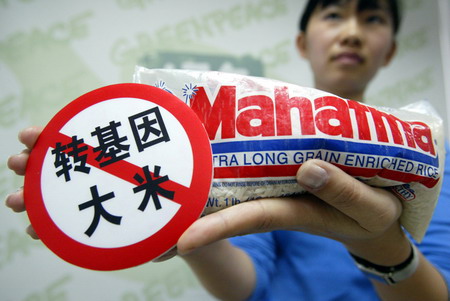Economy
Debate rages on over production of GM products
(China Daily)
Updated: 2010-11-22 13:24
 |
Large Medium Small |
|
 |
|
A woman holds a bag of US rice with a sign showing "no genetically modified food" at a supermarket in Beijing.[Photo / China Daily] |
BEIJING - Every time Zhao Fengxia shops for cooking oil, she checks the label to make sure she is buying non-genetically-modified (GM) soy oil.
"I am not sure whether GM food is safe or not. It just sounds scary," said Zhao, a 47-year-old food safety-conscious consumer who works in a Beijing hospital as an accountant. "I prefer non-GM soy oil, although it is more expensive than GM oil."
While there has been no evidence to show GM food is harmful to humans, controversy has been swirling around it for quite some time in China. It escalated after the Ministry of Agriculture granted bio-safety certificates to two pest-resistant GM rice varieties and a corn variety in November last year - a major step in promoting the research and planting of GM crops. The approval made China the first country in the world to give a nod to field trials of GM staple foods.
Officials, researchers and scientists are divided over whether and when GM food should be commercialized, despite consensus that more scientific research on GM technology should be encouraged. Supporters and opponents have also been facing off over environmental safety and economic security issues.
The Chinese government has put food security high on the agenda in its national development plans. China's State Council, or cabinet, approved a mid- and long-term grain security plan in 2008 that aims to keep annual output above 500 million tons by 2010 and to increase production to more than 540 million tons a year by 2020.
China's grain output reached 531 million tons last year, government data showed. But summer grain output fell by 0.3 percent this year to 123.1 million tons because of drought and low temperatures in grain-producing regions.
With an increasing population and more natural disasters, Chinese policymakers are eyeing technology as a solution and hope disease-resistant and high-yield crops developed by GM technology will help address the growing problem of food shortages.
The first major document issued by the central government this year also stressed the development of new crop varieties and the promotion of the industrialization of new GM strains.
"The application and research on GM agriculture is definitely a future trend in China and is among the strategic measures to strive for a more competitive agricultural sector through technology," Wei Chaoan, vice-minister of Agriculture, said in March.
In the same month, Premier Wen Jiabao, while delivering the government work report for 2010, said that the government would accelerate innovation and promote agricultural technology. It would also conduct research to develop new GM organisms.
Supporters of GM food believe that such crops will help increase output and ease the strain on food supply caused by shrinking farmlands and frequent natural disasters in the world's most populous country. GM crops are also less vulnerable to insects and diseases, which means they are safer for human beings and the environment, they argue.
Huang Dafang, director of the Biotechnology Research Institute under the Chinese Academy of Agricultural Sciences, is one of those supporters. He has repeatedly emphasized the safety of GM food to the media and said that genetically modified crops will be of great significance to the sustainable development of agriculture and China's competitiveness in the global arena.
He is confident about the commercialization of GM crops in the country: In March this year, he said that it would take at least three years before field trials to check the quality and long-term viability of the seeds are completed and make the two strains of GM rice ready for sale in China.
Zhang Qifa, a scientist at Wuhan-based Huazhong Agricultural University, who developed the certified GM rice, ate fried GM rice earlier this year to demonstrate his confidence in the safety of such foods.
| ||||
Professor Larry Hsien Ping Lang of the Chinese University of Hong Kong, a vocal critic of GM crops, denounced GM food as "toxic" in his book, the title of which can be translated to "New Imperialism in China".
In March, more than 100 people, including scholars and notable figures, signed a letter and sent it to Chinese legislators, warning that introducing GM staple crops could endanger the nation and national security.
It was delivered to the Standing Committee of the National People's Congress (NPC) before the NPC convened with the Chinese People's Political Consultative Conference.
The letter asked the committee to urge the State Council to immediately withdraw all safety certificates for modified corn and rice.
Leading agricultural scientist Yuan Longping has warned that some GM crops, particularly the anti-insect strains, need human trials over at least one or two generations, as their health implications remain unclear. Cheng Enfu, chairman of the World Association of Political Economy and senior professor of the Chinese Academy of Social Sciences, a government think-tank, said the safety of GM crops and the outlook on their commercialization was still uncertain.
He said the commercialization of GM crops would most likely be crippled as, even globally, many consumers thought consuming GM food was unsafe. Most countries still ban GM food and don't grow GM crops.
"Additionally, China has no advantage in advanced GM technology. Most GM technologies are introduced by foreign companies that hold GM food patents, making China subject to high patent charges," he said.



